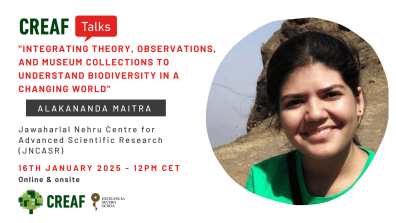CREAF Talk with Alakananda Maitra - "Integrating theory, observations, and museum collections to understand biodiversity in a changing world"
TITLE: "Integrating theory, observations, and museum collections to understand biodiversity in a changing world"
DATE: Thursday, 16th January 2025.
TIME & FORMAT: form 12 to 1pm CET - In-person and online.
Seminars will combine in-person and online formats (CREAF, Sala Graus II, Universitat Autònoma de Barcelona, Spain) but in all cases, talks will be always streamed (not recorded), so they can be followed online.
HOW TO CONNECT: direct link to Alakananda Maitra's conference.
SUMMARY OF THE WORKSHOP:
The global decline in biodiversity as a consequence of climate and land-use change calls for a comprehensive and multi-faceted understanding of the factors that shape species distributions. A species’ ability to persist in a given landscape is determined by the compatibility between its traits and the environment—a linkage that forms the mechanistic foundation of species distribution models. Birds, with their remarkable diversity, conspicuousness, and wealth of archival specimens, serve as an excellent taxon for testing eco-evolutionary theories pertaining to the environment-trait linkage.
In this talk, I will share insights from our research in the eastern Himalayas, where we used field observations of birds to test a model that predicts the shape of species distributions along environmental gradients. I will also highlight our work leveraging museum specimens to explore the diversity and evolution of complex bill morphologies in hornbills across the world. Finally, I will discuss my proposed research at CREAF, in collaboration with the Museu de Ciències Naturals de Barcelona, where I will study intraspecific trait diversity in birds in the context of global change.
ABOUT THE SPEAKER:
Alakananda completed her Bachelor's degree in Biotechnology from the National Institute of Technology, Durgapur, India, where she first developed an interest in Ecology and Biodiversity during summer internships with Prof. Uma Ramakrishnan at the National Centre for Biological Sciences, Bangalore. Subsequently, she worked as a research assistant with Dr. Sumanta Bagchi at the Indian Institute of Science, studying the impact of herbivory on carbon sequestration in the unique high-altitude ecosystems of the trans-Himalayas.
Alakananda pursued her PhD in ecology at the Indian Institute of Science Education and Research, Pune, under the supervision of Dr. Ramana Athreya, focusing on moths and birds in the eastern Himalayas. After completing her PhD, she joined the Jawaharlal Nehru Centre for Advanced Scientific Research in Bangalore as a postdoctoral research associate with Dr. Anand Krishnan, where she investigated the ecology and evolution of hornbills.



